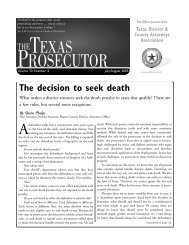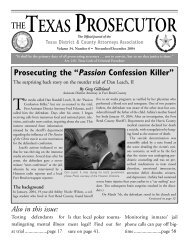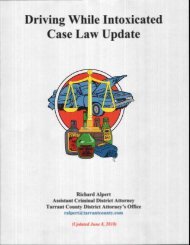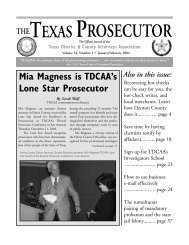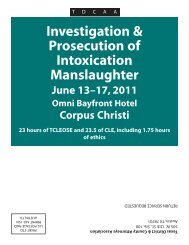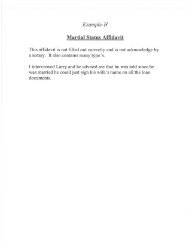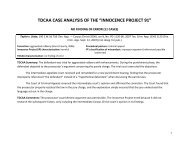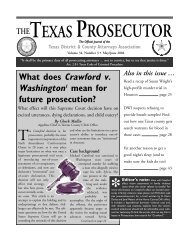Driving While Intoxicated Case Law Update - Texas District ...
Driving While Intoxicated Case Law Update - Texas District ...
Driving While Intoxicated Case Law Update - Texas District ...
Create successful ePaper yourself
Turn your PDF publications into a flip-book with our unique Google optimized e-Paper software.
Smith v. State, 158 S.W.3d 463 (Tex.Crim.App.2005).<br />
This wasa case where the defendant agreed to stiputate to two prior convictions in a fetony DWt<br />
trial. He later challenged the conviction on appeal on the basis that one of the priors was too remote<br />
under the current rule for calculating such priors as has been articulated in the Geffs case. The<br />
Court of Criminal Appeals upheld the conviction and the use of the remote prior stating that the<br />
defendant waived appellate challenge to remoteness of the "prior conviction used as predicate<br />
conviction for felony sentencing by confessing such prior conviction by stipulation."<br />
8. JURY INSTRUCTTON MUST ADDRESS THE STIPULATION<br />
Martin v. State, 200 S.W.3d 635, (Tex.Crim. App. 2006).<br />
Ihis is a felony DWI case that focused on alleged error in the jury instructions regarding failure to<br />
address the defendant's stipulation to his priors. Ihrs is a great opinion for those who have any<br />
doubts about the rules regarding the acceptance of such stipulations and how the priors may be<br />
addressed during the trial. ln part, the Court reaffirmed that: when a defendant offers to stipulate<br />
to jurisdictional priors in a felony DWI case, the State may (but is not required) to read the entire<br />
indictment, including the two jurisdictional allegations (but only those two) in arraigning the<br />
defendant in the presence of the jury; both the State and the defense may voir dire the jury<br />
concerning the range of punishment for both a felony and misdemeanor DWI; the jury need not be<br />
informed of the particulars of the prior convictions in reading the indictment, voir dire, opening or<br />
closing arguments or in the jury charge itself; a defendant's stipulation to the two prior DWls, being<br />
in the nature of a judicial admission, has the legal effect of removing the jurisdictional element from<br />
contention; a defendant may not offer evidence or argument in opposition to his stipulation; during<br />
the trial, the jury may be informed of the stipulation and any written stipulation may be offered into<br />
evidence before the jury, but the evidence is sufficient to support a defendant's conviction even if<br />
the stipulation is not given or read to the jury; in a bench trial, the guilt and punishment stages are<br />
not bifurcated, so the State is not required to offer the stipulation during the initial portion of the<br />
hearing, even if the proceeding is improperly bifurcated.<br />
The new requirements addressed by the Court are that:<br />
1) The jury charge must include some reference to the jurisdictional element of two prior DWI<br />
convictions in a felony DWI trial;<br />
2) The jury charge must include some reference to the defendant's stipulation and its legal effect<br />
of establishing the jurisdictional element.<br />
.3) Any error in failing to include in the jury charge some reference to the jurisdictional element and<br />
the stipulation is analyzed under Almanza.<br />
In this case, the charqe failed to do 1 thru 3. but Court found error to be harmless.<br />
9. DEFENDANTWHO STIPULATES TO PRIORS ON CONDITION THEY NOT<br />
BE MENTIONED WAIVES ABILITY TO COMPLAIN THEY WERE NOT<br />
PROVED<br />
Brvant v. State, 187 S.W.3d 397 (Tex.Crim.App.2005).<br />
ln this case, the defendant stipulated on the condition that the State not mention or offer evidence<br />
1_32



